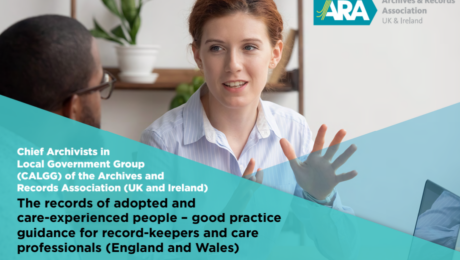Archives & Records Association launch new paper on the need for better access to records for care leavers.
Today marks the launch and publication of a new paper on better access to records for care leavers and the adopted. It is the result of a project lasting from November 2022 to March 2024, endorsed by a member of our association, Baroness Lola Young. Some members of our committee will be attending in eager anticipation of the launch in London at Bevin Hall, close to the Houses of Parliament. Three of our committee members, Dr.Julia Feast OBE, Dr. Jim Goddard and Isa Jaye contributed to the project personally.
To quote the introduction to the project:-
The guidance has been created as part of a project led by members of the Chief Archivists in Local Government Group (CALGG) who are part of the Archives and Records Association (United Kingdom and Ireland). An Advisory Group consisting of adopted and care experienced people, social work practitioners, and information/ data protection practitioners has guided the project …. Funding was received from The National Archives, the Welsh Government and from CALGG members.
The report is divided into several parts
- Creating records
- Managing and preserving records
- Providing access to records
- Summary of statutory guidance and minimum standards
It is argued that there should be parity between adoption records, and care records in that there is no statutory rule as to how long records should be preserved for those care leavers who have not been adopted. A fixed period of between 125 and 150 years is proposed, in order to last beyond the lifetime of most, and give the relatives of any deceased some clue as to their parents life, if indeed they are to be permitted to have access. The difficulties with access to records by the relatives of the deceased is highlighted
Mention is made of ensuring that if digitised, continued access to whatever format is used should be made possible both backwards and forwards in time. Tracking records centrally is recommended so that their location many years thereafter is not lost with time. Historically this has often been a problem, particularly during devolution of local authorities years ago, and the re-organisation of boundaries.
Examples of good and exemplary policy under all headings is conveniently given.
The old chestnut of redaction, and the need to keep it to a minimum for care-experienced people is underlined once again. The clamour for secrecy and ever increasing efforts to hide personal data from the prying eyes of the public/media works against the needs of the care leaver/adopted person to know about their personal history in detail.
The trauma involved in reading one’s records for the first time in detail is covered with recommendations for trauma training by those supervising access. The worst policy of a box of disorganised bits of paper is hopefully a thing of the past.
Finally, to quote Baroness Young
The CALGG led project has brought into sharp focus the necessity to ensure the longevity and preservation of these unique archives of care experienced and adopted people. We can think of these records as being very personal, because of course they are. But they are also of wider historical significance and an invaluable resource. They give texture to the story of society’s attempts to provide substitute families in circumstances where birth parents are not able to provide a nurturing, secure environment for their children.
To access a copy of the full report, click here
- Published in General, Press Releases

